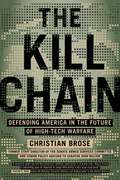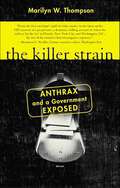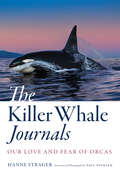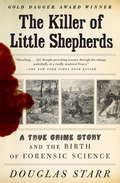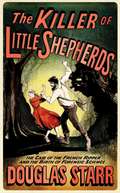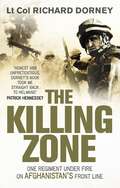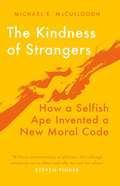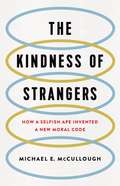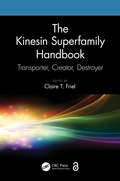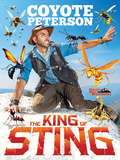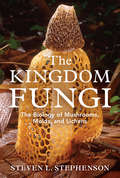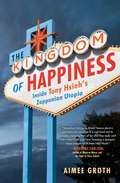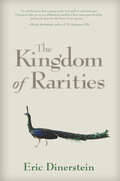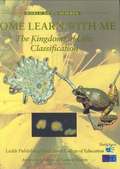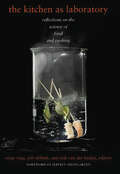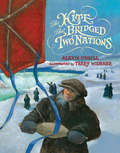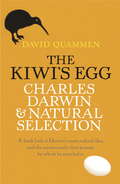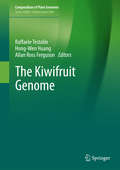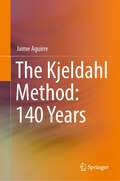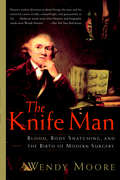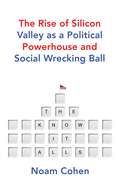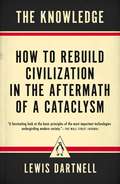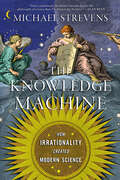- Table View
- List View
The Kill Chain: Defending America in the Future of High-Tech Warfare
by Christian BroseFor generations of Americans, our country has been the world's dominant military power. How the US military fights, and the systems and weapons that it fights with, have been uncontested. That old reality, however, is rapidly deteriorating. America's traditional sources of power are eroding amid the emergence of new technologies and the growing military threat posed by rivals such as China. America is at grave risk of losing a future war.As Christian Brose reveals in this urgent wake-up call, the future will be defined by artificial intelligence, autonomous systems, and other emerging technologies that are revolutionizing global industries and are now poised to overturn the model of American defense. This fascinating, if disturbing, book confronts the existential risks on the horizon, charting a way for America's military to adapt and succeed with new thinking as well as new technology. America must build a battle network of systems that enables people to rapidly understand threats, make decisions, and take military actions, the process known as "the kill chain." Examining threats from China, Russia, and elsewhere, The Kill Chain offers hope and, ultimately, insights on how America can apply advanced technologies to prevent war, deter aggression, and maintain peace.
The Killer Strain: Anthrax and a Government Exposed
by Marilyn W. ThompsonA lethal germ is unleashed in the U.S. mail. A chain of letters spreads terror from Florida to Washington, D.C., from New York to Connecticut, from the halls of Congress to the assembly lines of the U.S. Postal Service. Five people die, and ten thousand more line up for antibiotics to protect against exposure. The government, already outsmarted by the terrorist hijackers of 9/11, leaves its workers vulnerable and a diabolical killer on the loose.Based on hundreds of hours of interviews and a review of thousands of pages of government documents, The Killer Strain is the definitive account of the year in which bioterrorism became a reality in the United States. Revealing the little-known victims and unsung heroes in the anthrax debacle, investigative reporter Marilyn Thompson also examines the FBI's slow-paced investigation of the crimes and the unprecedented scientific challenges posed by the case.The Killer Strain, more than just a thrilling read, is also a clarion wake-up call. It shows how billions of dollars and a decade of elaborate bioterror dress rehearsals meant nothing in the face of a real attack -- and how we may still be at risk.
The Killer Whale Journals: Our Love and Fear of Orcas
by Hanne StragerExperience the hauntingly beautiful world of orcas, and discover the stories that unfold when humans enter oceans alongside them.When intrepid biology student Hanne Strager volunteered to be the cook on a small research vessel in Norway's Lofoten Islands, the trip inspired a decades-long journey into the lives of killer whales—and an exploration of people's complex relationships with the biggest predators on earth. The Killer Whale Journals chronicles the now internationally renowned science writer's fascinating adventures around the world, documenting Strager's personal experiences with orcas in the wild. Killer whales' incredible intelligence, long life spans, and strong family bonds lead many people to see them as kindred spirits in the sea. But not everyone feels this way—like wolves, orcas have been both beloved and vilified throughout human history. In this absorbing odyssey, Strager traces the complicated relationship between humans and killer whales, while delving into their behavior, biology, and ecology. She brings us along in her travels to the most remote corners of the world, battling the stormy Arctic seas of northern Norway with fellow biologists intent on decoding whale-song, interviewing First Nations conservationists in Vancouver, observing Inuit hunters in Greenland, and witnessing the dismantling of black market "whale jails" in the Russian wilderness of Kamchatka. Through these captivating stories, Strager introduces us to a diverse cast of characters from Inuit elders to Australian Aboriginal whalers and guides us through the world's wild waters, from fjords above the Arctic circle in Norway to the poaching-infested waters off Kamchatka. Featuring astonishing photographs from famed nature photographer and conservationist Paul Nicklen, The Killer Whale Journals reveals rare and intimate moments of connection with these fierce, brilliant predators.
The Killer of Little Shepherds
by Douglas StarrA riveting true crime story that vividly recounts the birth of modern forensics.At the end of the nineteenth century, serial murderer Joseph Vacher, known and feared as "The Killer of Little Shepherds," terrorized the French countryside. He eluded authorities for years--until he ran up against prosecutor Emile Fourquet and Dr. Alexandre Lacassagne, the era's most renowned criminologist. The two men--intelligent and bold--typified the Belle Époque, a period of immense scientific achievement and fascination with science's promise to reveal the secrets of the human condition. With high drama and stunning detail, Douglas Starr revisits Vacher's infamous crime wave, interweaving the story of how Lacassagne and his colleagues were developing forensic science as we know it. We see one of the earliest uses of criminal profiling, as Fourquet painstakingly collects eyewitness accounts and constructs a map of Vacher's crimes. We follow the tense and exciting events leading to the murderer's arrest. And we witness the twists and turns of the trial, celebrated in its day. In an attempt to disprove Vacher's defense by reason of insanity, Fourquet recruits Lacassagne, who in the previous decades had revolutionized criminal science by refining the use of blood-spatter evidence, systematizing the autopsy, and doing groundbreaking research in psychology. Lacassagne's efforts lead to a gripping courtroom denouement. The Killer of Little Shepherds is an important contribution to the history of criminal justice, impressively researched and thrillingly told.From the Hardcover edition.
The Killer of Little Shepherds: The Case of the French Ripper and the Birth of Forensic Science
by Douglas StarrAt the end of the nineteenth century, serial murderer Joseph Vacher, dubbed "The Killer of Little Shepherds," terrorized the French countryside. He eluded authorities for years-until he ran up against prosecutor Emile Fourquet and Dr. Alexandre Lacassagne, the era's most renowned criminologist. The two men typified the Belle Epoque, a period of immense scientific achievement and fascination with its promise to reveal the secrets of the human condition. With high drama and stunning detail, Douglas Starr recounts the infamous crime and punishment of Vacher, interweaving the story of how Lacassagne and his colleagues developed forensics as we know it. We see one of the earliest uses of criminal profiling, as Fourquet painstakingly collects eyewitness accounts, leading to Vacher's arrest. And we see the twists and turns of the celebrated trial: to disprove Vacher's defense by reason of insanity, Fourquet recruits Lacassagne, who had revolutionized criminal science: refining the use of blood spatter evidence, systematizing the autopsy and doing ground-breaking research in psychology. Lacassagne's forensic investigation ranks among the greatest of all time, and its denouement is gripping. An important contribution to the history of medicine and criminal justice, impressively researched and thrillingly told.
The Killing Zone
by Richard DorneyOn a tour of duty in the Helmand River Valley, the Grenadier Guards faced the toughest challenge of their lives...Carrying out patrols in the most fiercely contested land in Afghanistan the Guards were under fire almost constantly. The summer of 2007 saw some of the most frequent and intense combat yet, beyond what anyone could have predicted. Based in isolated forward operating bases their nearest reinforcements were often miles away, down a track strewn with deadly roadside bombs. The Killing Zone is an action-packed and authentic insight into the real Afghanistan. This is what it’s like to deliberately draw fire on your own position so that your mates can escape an ambush, to experience the adrenaline rush of being the first in to clear a Taliban compound, and to rely on skill, loyalty and quick-thinking to survive in one of the most dangerous places on earth.
The Kindness of Strangers: How a Selfish Ape Invented a New Moral Code
by Michael E. McCulloughWhy do we give a damn about strangers? Altruism is unique to the human species. It is also one of the great evolutionary puzzles, and we may be on the brink of solving it. It turns out that, over the last 12,000 years, we have become more and more altruistic. This is despite the fact that, the majority of the time, our minds are still breathtakingly indifferent to the welfare of others. In solving the enigma of generosity in a world of strangers, McCullough takes us on a sweeping history of society and science to warn that, if we are not careful, our instincts and sympathies have as much potential for harm as for good. The bad news is that we are not designed to be kind. The good news is that we can push ourselves to be kind anyway, together.
The Kindness of Strangers: How a Selfish Ape Invented a New Moral Code
by Michael E. McCulloughA sweeping psychological history of human goodness -- from the foundations of evolution to the modern political and social challenges humanity is now facing. How did humans, a species of self-centered apes, come to care about others? Since Darwin, scientists have tried to answer this question using evolutionary theory. In The Kindness of Strangers, psychologist Michael E. McCullough shows why they have failed and offers a new explanation instead. From the moment nomadic humans first settled down until the aftermath of the Second World War, our species has confronted repeated crises that we could only survive by changing our behavior. As McCullough argues, these choices weren't enabled by an evolved moral sense, but with moral invention -- driven not by evolution's dictates but by reason. Today's challenges -- climate change, mass migration, nationalism -- are some of humanity's greatest yet. In revealing how past crises shaped the foundations of human concern, The Kindness of Strangers offers clues for how we can adapt our moral thinking to survive these challenges as well.
The Kinesin Superfamily Handbook: Transporter, Creator, Destroyer
by Claire T. FrielThis book brings together current information on the families that make up the kinesin superfamily of molecular motors in one comprehensive text; an ideal reference for researchers looking to make comparisons between different families, for specific information on an individual family, or simply for an overview of the kinesin superfamily.Information is clearly structured and grouped according to individual families and organised in a standardised way, allowing the reader to easily search and retrieve information on this large superfamily of molecular motors and understand how its individual members carry out a diverse variety of cellular functions. Features: The first book dedicated to the entire kinesin superfamily Enables a fuller understanding of this family of proteins, which is becoming an increasing focus of research due to its involvement in diseases such as cancer, neuropathies and ciliopathies. Written in a manner accessible to a range of researchers in the life and medical sciences, including biophysicists, biochemists and medical researchers. Chapter 4 of this book is freely available as a downloadable Open Access PDF under a Creative Commons Attribution-Non Commercial-No Derivatives 4.0 license. Chapter 11 of this book is freely available as a downloadable Open Access PDF under a Creative Commons Attribution-Non Commercial-No Derivatives 4.0 license.
The King of Sting (Brave Wilderness)
by Coyote Petersonp.p1 {margin: 0.0px 0.0px 0.0px 0.0px; font: 15.0px Calibri; -webkit-text-stroke: #000000} span.s1 {font-kerning: none} Wildlife expert Coyote Peterson brings his 12.5 million YouTube subscribers and legions of kid fans a highly designed, full-color exploration of his "Sting Zone" adventure series, culminating in his thrilling encounter with the "King of Sting"--the Executioner Wasp. Coyote Peterson, YouTube star, animal enthusiast, and creator of the Brave Adventure series, has tracked down some of the world's most painfully stinging insects and chronicled getting stung by each of them on his YouTube channel. Coyote has saved the best--or possibly the worst--for last, and he's finally ready to share his experience with the most painful sting in the world: the Executioner Wasp. Featuring full-color stills from his show, and packed with facts about nature's most misunderstood creatures, King of Sting is a dream book for any kid that loves animals, bugs, outdoor exploration, and danger!
The Kingdom Fungi: The Biology of Mushrooms, Molds, and Lichens
by Steven L. StephensonThe ubiquitous fungi are little known and vastly underappreciated. Yet, without them we wouldn’t have bread, alcohol, cheese, tofu, or the unique flavors of mushrooms, morels, and truffles. We can’t survive without fungi. The Kingdom Fungi provides a comprehensive look at the biology, structure, and morphological diversity of these necessary organisms. It sheds light on their ecologically important roles in nature, their fascinating relationships with people, plants, and animals, and their practical applications in the manufacture of food, beverages, and pharmaceuticals. The book includes information about “true” fungi, fungus-like creatures (slime molds and water molds), and a group of “composite” organisms (lichens) that are more than just fungi. Particular attention is given to examples of fungi that might be found in the home and encountered in nature. The Kingdom Fungi is a useful introductory text for naturalists, mycologists, and anyone who wants to become more familiar with, and more appreciative of, the fascinating world of fungi.
The Kingdom of Happiness: Inside Tony Hsieh's Zapponian Utopia
by Aimee GrothFearless gonzo journalism—an insider’s look at the enigmatic and successful CEO of Zappos, Tony Hsieh, and his quest to create his own version of utopia in the center of Las Vegas.In 2010 Tony Hsieh was introduced to many as a visionary modern business leader. Under Hsieh’s leadership, Zappos became the world’s largest online shoe company by championing satisfied customers and a valued workforce. After his company was purchased by Amazon, even as he continued as its CEO, Hsieh engaged his energies and considerable fortune toward a much larger goal: building a new and more socially conscious Silicon Valley in the heart of downtown Las Vegas, all within his five-year plan. Hsieh challenged business and technology journalist Aimee Groth to uproot her life and participate in his social engineering experiment. Beginning with couch surfing, moving to a Downtown Project crash pad, and then living in Zappos corporate housing above the Gold Spike bar, Groth had a front-row view of Hsieh’s efforts to build his ideal society. With interviews from insiders on all ends of the Zappos spectrum—like the “broken dolls” who gravitate toward Hsieh’s almost cultlike personality and make up some of his inner circle, to the Zapponians who live and work on campus, to players in the top echelon of Silicon Valley—Groth offers a unique view of a world few people know much about, and sheds a new light on this complex, eccentric man. The Kingdom of Happiness is the story of one man’s quest to create his own nirvana in the desert based on his exacting design and experimentation with lessons he’s gleaned not only from the incredible success of Zappos, but also from rave culture and Burning Man. Is it the business model of the future or a cautionary tale of hubris?
The Kingdom of Rarities
by Eric DinersteinWhen you look out your window, why are you so much more likely to see a robin or a sparrow than a Kirtland's warbler or a California condor? Why are some animals naturally rare and others so abundant? The quest to find and study seldom-seen jaguars and flamboyant Andean cocks-of-the-rock is as alluring to naturalists as it is vitally important to science. From the Himalayan slopes of Bhutan to the most isolated mountain ranges of New Guinea, The Kingdom of Rarities takes us to some of the least-traveled places on the planet to catch a glimpse of these unique animals and many others. As he shares stories of these species, Eric Dinerstein gives readers a deep appreciation of their ecological importance and the urgency of protecting all types of life -- the uncommon and abundant alike. An eye-opening tour of the rare and exotic, The Kingdom of Rarities offers us a new understanding of the natural world, one that places rarity at the center of conservation biology. Looking at real-time threats to biodiversity, from climate change to habitat fragmentation, and drawing on his long and distinguished scientific career, Dinerstein offers readers fresh insights into fascinating questions about the science of rarity and unforgettable experiences from the field.
The Kingdoms of Life: Classification
by Bridget AndersonMore than two million different species of organisms live on Earth--in all kinds of climates and places, ranging from the freezing North Pole to hot and steamy jungles, and from the highest mountains to the nethermost depths of the oceans. How do we keep track of the teeming abundance of life on Earth? Throughout history, humans have always been busy naming and classifying all living things. That process continues today. THE KINGDOMS OF LIFE: CLASSIFICATION explores the amazing diversity of life on Earth and details one way scientists currently organize their records to make sure no organism is left unnamed and unclassified.
The Kitchen as Laboratory: Reflections on the Science of Food and Cooking (Arts and Traditions of the Table Perspectives on Culinary History)
by César Vega, Job Ubbink and Erik van der Linden&“Provides good perspective on the scientific approach to cooking while reflecting the interests and passions of each essay&’s author.&”—Peter Barham, author of The Science of CookingIn this global collaboration of essays, chefs and scientists advance culinary knowledge by testing hypotheses rooted in the physical and chemical properties of food. Using traditional and cutting-edge tools, ingredients, and techniques, these pioneers create, and sometimes revamp, dishes that respond to specific desires and serve up an original encounter with gastronomic practice. From the seemingly mundane to the food fantastic—from grilled cheese sandwiches, pizzas, and soft-boiled eggs to Turkish ice cream, sugar glasses, and jellified beads—the essays in The Kitchen as Laboratory cover a range of creations and their history and culture. This collection will delight experts and amateurs alike, especially as restaurants rely more on science-based cooking and recreational cooks increasingly explore the physics and chemistry behind their art. Contributors end each essay with their personal thoughts on food, cooking, and science, offering rare insight into a professional&’s passion for playing with food.&“Where else can one have fun pondering the acoustics of crunchy foods or the texture of an ice cream that stretches like a rubber band?&”—Robert Wolke, author of What Einstein Told His Cook: Kitchen Science Explained &“Not only an in-depth study of many areas of food science, but also an entertaining read. For someone like me, who relishes understanding more about cooking from the inside out, it&’s heartening to see this area of literature expanded.&”—Chef Wylie Dufresne, wd~50
The Kitchen as Laboratory: Reflections on the Science of Food and Cooking (Arts and Traditions of the Table: Perspectives on Culinary History)
by César Vega Job Ubbink Erik van der LindenEating is a multisensory experience, yet chefs and scientists have only recently begun to deconstruct food's components, setting the stage for science-based cooking. In this global collaboration of essays, chefs and scientists advance culinary knowledge by testing hypotheses rooted in the physical and chemical properties of food. Using traditional and cutting-edge tools, ingredients, and techniques, these pioneers create, and sometimes revamp, dishes that respond to specific desires and serve up an original encounter with gastronomic practice.From the seemingly mundane to the food fantastic—from grilled cheese sandwiches, pizzas, and soft-boiled eggs to Turkish ice cream, sugar glasses, and jellified beads—the essays in The Kitchen as Laboratory cover a range of creations and their history and culture. They consider the significance of an eater's background and dining atmosphere and the importance of a chef's methods, as well as the strategies used to create a great diversity of foods and dishes. This collection will delight experts and amateurs alike, especially as restaurants rely more on science-based cooking and recreational cooks increasingly explore the physics and chemistry behind their art. Contributors end each essay with their personal thoughts on food, cooking, and science, offering rare insight into a professional's passion for playing with food.
The Kite that Bridged Two Nations: Homan Walsh and the First Niagara Suspension Bridge
by Alexis O'NeillHoman Walsh loves to fly his kite. And when a contest is announced to see whose kite string can span Niagara Falls, Homan is set on winning, despite the cold and the wind—and even when his kite is lost and broken. Homan's determination is beautifully captured in this soaring, poetic picture book that features Terry Widener's stunning acrylic paintings. Both author and illustrator worked with experts on both sides of the falls to accurately present Homan Walsh's story. The book also includes an extensive author's note, timeline, bibliography, and further resources.
The Kiwi's Egg: Charles Darwin and Natural Selection
by David QuammenEvolution, during the early nineteenth century, was an idea in the air. Other thinkers had suggested it, but no one had proposed a cogent explanation for how evolution occurs. Then, in September 1838, a young Englishman named Charles Darwin hit upon the idea that 'natural selection' among competing individuals would lead to wondrous adaptations and species diversity. Twenty-one years passed between that epiphany and publication of On the Origin of Species. The human drama and scientific basis of Darwin's twenty-one-year delay constitute a fascinating, tangled tale that elucidates the character of a cautious naturalist who initiated an intellectual revolution.The Kiwi's Egg is a book for everyone who has ever wondered about who this man was and what he said. Drawing from Darwin's secret 'transmutation' notebooks and his personal letters, David Quammen has sketched a vivid life portrait of the man whose work never ceases to be controversial.
The Kiwifruit Genome
by Raffaele Testolin Hong-Wen Huang Allan Ross FergusonThis book describes the basic botanical features of kiwifruit and its wild relatives, reports on the steps that led to its genome sequencing, and discusses the results obtained with the assembly and annotation. The core chapters provide essential insights into the main gene families that characterize this species as a crop, including the genes controlling sugar and starch metabolism, pigment biosynthesis and degradation, the ascorbic-acid pathway, fruit softening and postharvest metabolism, allergens, and resistance to pests and diseases. The book offers a valuable reference guide for taxonomists, geneticists and horticulturists. Further, since information gained from the genome sequence is extraordinarily useful in assessing the breeding value of individuals based on whole-genome scans, it will especially benefit plant breeders. Accordingly, chapters are included that focus on gene introgression from wild relatives and genome-based breeding.
The Kjeldahl Method: 140 Years
by Jaime AguirreThis book provides a comprehensive survey of the Kjeldahl method and its modifications. It covers all relevant topics, including sample digestion and its variables, distillation and determination of ammonia, equipment development, and concludes with a review of the literature published on the method. Since its introduction in 1883, the Kjeldahl method has been an essential analytical tool for nitrogen determination in research, academic and industrial laboratories. This makes the history of the Kjeldahl method of outstanding relevance to graduate students, postgraduate students, researchers, teachers, and laboratory staff in the fields of analytical chemistry, food/feed analysis, animal/human nutrition, soil/water analysis, and so forth."This method has probably been applied in one modification or another to every possible form of nitrogen, and in perhaps more laboratories than almost any other single type of analytical method" (Kirk, 1950).
The Knife Man: Blood, Body Snatching, and the Birth of Modern Surgery
by Wendy MooreThe vivid, often gruesome portrait of the 18th century pioneering surgeon and father of modern medicine, John Hunter. In the gothic horror story, Dr Jekyll and Mr Hyde, the house of the genial doctor turned fiend is reputedly based on the home of the 18th century surgeon and anatomist John Hunter. The choice was understandable, for Hunter combined an altruistic determination to advance scientific knowledge with dark dealings that brought him into daily contact with the sinister Georgian underworld. In 18th century London, Hunter was a man both acclaimed and feared. John Hunter revolutionized surgical practice through his groundbreaking experiments. Driven by an insatiable curiosity, he dissected thousands of human bodies, using the knowledge he gained to improve medical care for countless patients, including some very illustrious people, Joshua Reynolds and Lord Byron among them. He was appointed Surgeon Extraordinary to King George III. InThe Knife Man, Wendy Moore unveils a world characterized by hangings at the Tyburn Tree, by gruesome expeditions to dank churchyards, and by countless human dissections in attic rooms — large sums were paid to body-snatchers for stolen corpses which were delivered to his back door. Meticulously researched,The Knife Manis a fascinating portrait of a scientist determined to haul surgery out of the realm of superstition and into the dawn of modern medicine.
The Know-It-Alls: The Rise of Silicon Valley as a Political Powerhouse and Social Wrecking Ball
by Noam CohenThe world&’s tech giants are at the centre of controversies over fake news, free speech and hate speech on platforms where influence is bought and sold. Yet, at the outset, almost everyone thought the internet would be a positive, democratic force, a space where knowledge could be freely shared to enable everyone to make better-informed decisions. How did it all go so wrong? Noam Cohen reports on the tech libertarians of Silicon Valley, from the self-proclaimed geniuses Jeff Bezos, Peter Thiel, Reid Hoffman and Mark Zuckerberg to the early pioneers at Stanford University, who have not only made the internet what it is today but reshaped society in the process. It is the story of how the greed, bias and prejudice of one neighbourhood is fracturing the Western world.
The Knowledge
by Lewis DartnellHow would you go about rebuilding a technological society from scratch? If our technological society collapsed tomorrow, perhaps from a viral pandemic or catastrophic asteroid impact, what would be the one book you would want to press into the hands of the postapocalyptic survivors? What crucial knowledge would they need to survive in the immediate aftermath and to rebuild civilization as quickly as possible--a guide for rebooting the world? Human knowledge is collective, distributed across the population. It has built on itself for centuries, becoming vast and increasingly specialized. Most of us are ignorant about the fundamental principles of the civilization that supports us, happily utilizing the latest--or even the most basic--technology without having the slightest idea of why it works or how it came to be. If you had to go back to absolute basics, like some sort of postcataclysmic Robinson Crusoe, would you know how to re-create an internal combustion engine, put together a microscope, get metals out of rock, accurately tell time, weave fibers into clothing, or even how to produce food for yourself? Regarded as one of the brightest young scientists of his generation, Lewis Dartnell proposes that the key to preserving civilization in an apocalyptic scenario is to provide a quickstart guide, adapted to cataclysmic circumstances. The Knowledge describes many of the modern technologies we employ, but first it explains the fundamentals upon which they are built. Every piece of technology rests on an enormous support network of other technologies, all interlinked and mutually dependent. You can't hope to build a radio, for example, without understanding how to acquire the raw materials it requires, as well as generate the electricity needed to run it. But Dartnell doesn't just provide specific information for starting over; he also reveals the greatest invention of them all--the phenomenal knowledge-generating machine that is the scientific method itself. This would allow survivors to learn technological advances not explicitly explored in The Knowledge as well as things we have yet to discover. The Knowledge is a brilliantly original guide to the fundamentals of science and how it built our modern world as well as a thought experiment about the very idea of scientific knowledge itself.
The Knowledge
by Lewis DartnellHow would you go about rebuilding a technological society from scratch?If our technological society collapsed tomorrow, perhaps from a viral pandemic or catastrophic asteroid impact, what would be the one book you would want to press into the hands of the postapocalyptic survivors? What crucial knowledge would they need to survive in the immediate aftermath and to rebuild civilization as quickly as possible--a guide for rebooting the world?Human knowledge is collective, distributed across the population. It has built on itself for centuries, becoming vast and increasingly specialized. Most of us are ignorant about the fundamental principles of the civilization that supports us, happily utilizing the latest--or even the most basic--technology without having the slightest idea of why it works or how it came to be. If you had to go back to absolute basics, like some sort of postcataclysmic Robinson Crusoe, would you know how to re-create an internal combustion engine, put together a microscope, get metals out of rock, accurately tell time, weave fibers into clothing, or even how to produce food for yourself?Regarded as one of the brightest young scientists of his generation, Lewis Dartnell proposes that the key to preserving civilization in an apocalyptic scenario is to provide a quickstart guide, adapted to cataclysmic circumstances. The Knowledge describes many of the modern technologies we employ, but first it explains the fundamentals upon which they are built. Every piece of technology rests on an enormous support network of other technologies, all interlinked and mutually dependent. You can't hope to build a radio, for example, without understanding how to acquire the raw materials it requires, as well as generate the electricity needed to run it. But Dartnell doesn't just provide specific information for starting over; he also reveals the greatest invention of them all--the phenomenal knowledge-generating machine that is the scientific method itself. This would allow survivors to learn technological advances not explicitly explored in The Knowledge as well as things we have yet to discover.The Knowledge is a brilliantly original guide to the fundamentals of science and how it built our modern world as well as a thought experiment about the very idea of scientific knowledge itself.
The Knowledge Machine: How Irrationality Created Modern Science
by Michael Strevens“The Knowledge Machine is the most stunningly illuminating book of the last several decades regarding the all-important scientific enterprise.” —Rebecca Newberger Goldstein, author of Plato at the Googleplex A paradigm-shifting work, The Knowledge Machine revolutionizes our understanding of the origins and structure of science. • Why is science so powerful? • Why did it take so long—two thousand years after the invention of philosophy and mathematics—for the human race to start using science to learn the secrets of the universe? In a groundbreaking work that blends science, philosophy, and history, leading philosopher of science Michael Strevens answers these challenging questions, showing how science came about only once thinkers stumbled upon the astonishing idea that scientific breakthroughs could be accomplished by breaking the rules of logical argument. Like such classic works as Karl Popper’s The Logic of Scientific Discovery and Thomas Kuhn’s The Structure of Scientific Revolutions, The Knowledge Machine grapples with the meaning and origins of science, using a plethora of vivid historical examples to demonstrate that scientists willfully ignore religion, theoretical beauty, and even philosophy to embrace a constricted code of argument whose very narrowness channels unprecedented energy into empirical observation and experimentation. Strevens calls this scientific code the iron rule of explanation, and reveals the way in which the rule, precisely because it is unreasonably close-minded, overcomes individual prejudices to lead humanity inexorably toward the secrets of nature. “With a mixture of philosophical and historical argument, and written in an engrossing style” (Alan Ryan), The Knowledge Machine provides captivating portraits of some of the greatest luminaries in science’s history, including Isaac Newton, the chief architect of modern science and its foundational theories of motion and gravitation; William Whewell, perhaps the greatest philosopher-scientist of the early nineteenth century; and Murray Gell-Mann, discoverer of the quark. Today, Strevens argues, in the face of threats from a changing climate and global pandemics, the idiosyncratic but highly effective scientific knowledge machine must be protected from politicians, commercial interests, and even scientists themselves who seek to open it up, to make it less narrow and more rational—and thus to undermine its devotedly empirical search for truth. Rich with illuminating and often delightfully quirky illustrations, The Knowledge Machine, written in a winningly accessible style that belies the import of its revisionist and groundbreaking concepts, radically reframes much of what we thought we knew about the origins of the modern world.
